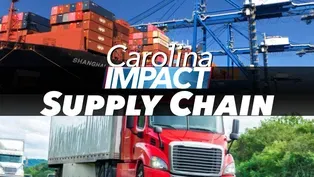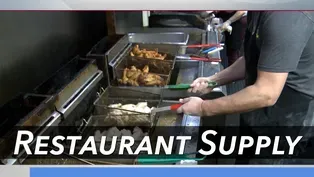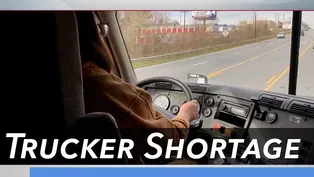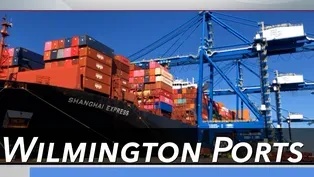
Carolina Impact: Supply Chain
Season 9 Episode 15 | 26m 56sVideo has Closed Captions
The supply chain crisis is affecting ports, restaurants and the trucking industry
Learn how the supply chain crisis is affecting ports, restaurants and the trucking industry.
Problems with Closed Captions? Closed Captioning Feedback
Problems with Closed Captions? Closed Captioning Feedback
Carolina Impact is a local public television program presented by PBS Charlotte

Carolina Impact: Supply Chain
Season 9 Episode 15 | 26m 56sVideo has Closed Captions
Learn how the supply chain crisis is affecting ports, restaurants and the trucking industry.
Problems with Closed Captions? Closed Captioning Feedback
How to Watch Carolina Impact
Carolina Impact is available to stream on pbs.org and the free PBS App, available on iPhone, Apple TV, Android TV, Android smartphones, Amazon Fire TV, Amazon Fire Tablet, Roku, Samsung Smart TV, and Vizio.

Introducing PBS Charlotte Passport
Now you can stream more of your favorite PBS shows including Masterpiece, NOVA, Nature, Great British Baking Show and many more — online and in the PBS Video app.Providing Support for PBS.org
Learn Moreabout PBS online sponsorship- [Narrator] Wells Fargo is proud to support diversity, equity and inclusion in our employees, our customers and the communities we serve, as well as through content on Carolina Impact.
- [Narrator] This is a production of PBS Charlotte.
(ambient music) - Just ahead on Carolina Impact.
- Could today supply chain pain be tomorrow's gain for the Port of Wilmington?
I'm Jeff Sonier, find out how a busier port closer to home here in the Carolinas, might mean less expensive products for us.
- I'm Sarah Colon-Harris, how the demand for truck drivers has companies paying more and trucking schools like this one seeing an uptake in enrollment.
- And how about a supply chain success story, right here in the Carolinas.
How a small town textile company is winning its fight against cheap imports all over again.
Our special Carolina Impact on America's Supply Chain starts right now.
(upbeat music) - [Announcer] Carolina Impact, covering the issues, people and places that impact you.
This is Carolina Impact.
(upbeat music) - Good evening.
Thanks so much for joining us, I'm Amy Burkett.
While cargo ships play the supply chain waiting game at ports around the country, here in Charlotte we're waiting too, for prices to come down and shelves to fill up with the products we need, but can't get or can't afford.
But the supply chain isn't broken everywhere.
At North Carolina's Port of Wilmington, well, there's no wait at all.
No ship stuck offshore and no shortage of trucks or trains either, to transport those shipped in products to the warehouse or the store.
In Wilmington Carolina Impacts, Jeff Sonier, takes us out to meet one of those big container ships on its trip into the port, that could help solve our supply chain problems in the future.
- Yeah, so imagine getting an invitation from the state of North Carolina, come visit us, but don't stay too long, we wanna get you out of here, soon as possible.
Well, that's pretty much what overseas shippers wanna hear.
Easy in, easy out, no delays.
So if you're one of those big cargo ships waiting for days outside of other ports, well, welcome to Wilmington.
(dramatic music) (ship honking) 28 miles away from Wilmington.
Well, we're so far offshore, you can't see land anymore.
And that's where we meet the container ship, Shanghai Express, waiting for its guide into Wilmington.
How rough is it today compared to normal?
- It gets pretty nasty.
- [Jeff] That guide is Jason McDowell.
Gazing up at the ships oversee cargo, massive metal boxes stacked high and wide for a bumpy ocean ride.
As McDowell's pilot boat pulls up alongside the Shanghai Express, navigating choppy seas, stiff ocean breeze, and a giant wake behind the giant ship itself.
- [Voice Over] This is coast guard sector, North Carolina 22 alpha, captain are you a member of commercial service over?
- [Jeff] Until finally his boat's close enough, that McDonnell braving the waves and the water and the wind can reach over to the ship's rusty hall and then using old dropdown rope ladder.
(wind whooshing) McDowell makes his way up through the open hatch on the ships Port South.
(bright music) - I'm on board and I'll go to the bridge and there's a pilot captain exchange, and then I'll take responsibility for the ship.
- [Jeff] McDowell's a river pilot based here in nearby South Port where the foreign freighters crews close by the boat docks along the downtown waterfront.
Each cargo ship on a slow three hour trip through the shallows and narrows of the Cape Vier River.
- The CF can hold 14,500 stratified container.
So it's as big as they come in here.
- [Jeff] But not until McDonnell makes sure the winds are calm enough.
- If you have a strong wind on the beam, it's really, really hard to offset.
- [Jeff] And the waters deep enough.
- [McDowell] Once he started in, there's no turning around.
You're committed for 28 miles.
(horn blaring) (dramatic music) - [Jeff] And then once in Wilmington, well, the Shanghai Express becomes more like a floating warehouse, unloading cargo, and then reloading cargo at America's fastest freight port.
Okay maybe not this fast, but Wilmington is still pretty damn fast.
- In terms of how quick we get ships in and out, how quick we get trucks in and out.
We have the fastest productivity times in the United States.
So it's a great performance reputation here.
- Chief Commercial Officer, Hans Bean tells PBS Charlotte, that in the middle of a supply chain breakdown, Wilmington's business proposition to the shipping companies is a simple one, unload today, no delay.
(dramatic music) - It's usually within 24 hours from arrival to departure, they're in and out.
- [Jeff] And that is part of the selling point for Wilmington?
- It is, there's no queue outside to get in, there's available birth capacity, available crane.
Timing is excellent for us to be an alternative to a supply chain that is in disarray right now.
- [Jeff] Executive director, Brian Clark adds this is the moment North Carolina Ports have been investing in waiting for for years, a chance to compete with those bigger busier old, reliable ports that suddenly aren't so reliable anymore.
But the overseas shipping companies are now forced to stay and pay day after day.
- They really say ships make money when they're moving, when they're waiting in the queue, it really is just an enormous cost, but I think the ocean carriers are also seeing now, okay, this is going to be here for awhile.
We need to think about alternative gateways and additional ports.
- [Jeff] Meanwhile, when ships anchor in Wilmington instead there's no wait.
Trucks known as Yard Hustlers line up alongside the Shanghai Express as the state owned cranes stretch across the ship's wide deck and into its deep cargo hold.
Those tractor trailer sized containers plucked out and then trucked out one by one, load after load, hitting the road every 90 seconds or so.
- We don't have any congestion and I think typically we're getting truckers in and out of here 20 or 30 minutes.
And that's unheard of in the industry.
- [Jeff] What are they offloading here in Wilmington?
- I mean, it could be anything from tools, hardware, auto parts, consumer goods.
It could be a parallel.
- You must shake your head and say, we've got births.
We've got truckers ready to go.
And when you see these other ports that are stacked up.
- There's been a lot of discussions with carriers and cargo interests based on the availability that we do have.
- In fact, the supply chain waiting game at other ports today could actually become a win, win, win for North Carolina tomorrow.
(ship honking) More ships docking here in the future, translating into more jobs and fewer empty shelves and maybe even cheaper prices.
- And I think that's what we're seeing, costs aren't just elevated in other places, they're mushrooming because of the delays and the disruption, none of that here.
- Hopefully that eventually gets to the consumer for just lower cost overall.
- [Jeff] Yep, all because of that gritty, not pretty blue collar port in white collar Wilmington, the big cranes you can just barely see just beyond the bridge, but you do see the big ships that come and go, sometimes up close from the River walk or maybe from the beach off in the distance, maybe with Jason McDowell onboard.
- The ship I'm on, when it leaves here, it will go to Savannah and will have to wait, you think that there's no delays in Wilmington, and we're four hours from Savannah, why not bring the ship in here?
(ship honking) - So when will we see more of those big cargo ships making more trips to Wilmington like the Shanghai Express already does?
Well, the Port of Wilmington telling those overseas shippers, if you want to avoid supply chain strain, if you don't like waiting outside of other ports, well, Wilmington is waiting too for them and their shipping business right now, Amy.
- Thanks so much, Jeff.
You can learn more about the Port of Wilmington at pbscharlotte.org.
There's a link there to the North Carolina Ports website with info on how they're helping North Carolina businesses survive the supply chain waiting game.
Well, most everyone is feeling the pinch caused by worker shortages, but latest data from the American Trucking Association reveals the industry needs 80,000 drivers.
Retirements, more demand for goods and stricter regulations are creating a bottleneck.
Carolina Impacts, Sarah Colon Harris takes us behind the wheel to learn how driving schools are working to meet the demand.
(upbeat music) - It's a really good feeling to be in control of such a big vehicle.
- [Sarah] As a student driver, Caitlin Monauni is getting the hang of things.
- [Caitlin] It's actually been a lot of fun driving.
- [Sarah] Caitlin is one of millions of Americans changing careers post-pandemic.
After years of working in the restaurant industry, she said staffing shortages and pay cuts forced her to make a tough decision.
- Being a female in a predominantly male work environment hindered me looking into it but I just made the decision.
I talked to some friends who are truck drivers and they said just go for it.
- [Sarah] Now in her second week of training at TransTech Driving School in Newton, Caitlin only has two more weeks left until she tests for her commercial driver's license.
The state of North Carolina requires 160 hours of instruction.
- I will be making way more money than I've made before.
I'm getting to travel, see the United States and really just learning something new, I love learning.
- Here at TransTech driving school, 1900 students graduated from the program last year.
That's 30% more than their best year in 2019.
(truck engine roaring) - I hate to say we were in the perfect storm.
- [Sarah] Eric Wright is the Senior Director of Business Operations and Development at TransTech.
He says, although enrollment numbers are up, the additional drivers still aren't enough to meet the demand exacerbated by the pandemic.
- You are also seeing a lot of the individuals who were ex truck drivers in the industry for 25, 30 years, who used the pandemic as a means to go on and retire and things of that nature.
You're starting to see new regulatory implementations come in from both the state and federal government that took out 70,000 drivers.
- [Sarah] For other, the long hours and solo lifestyle can take its toll.
- The biggest sacrifice you make as a driver, is away from hometown.
So what we see happening within our industry a lot is people saying, oh, well this is a good opportunity.
You can make good money as a driver.
They get out here and they realize how much away from home time it takes to do this job.
They do it for say six months or something.
They say, Hey, this ain't for me.
- [Sarah] The nationwide shortage of truck drivers continues to cause disruptions in the supply chain.
Recent data shows in 2020, trucks moved more than 10 billion tons of freight down from nearly 12 billion the previous year.
The industry employed more than 3 million professional drivers, trucks moved $695 billion worth of goods across the Canadian and Mexico borders.
- We are very impulsive individuals.
We want what we want and we want it now.
- [Sarah] Furniture, toys, food now being delivered weeks and months behind schedule.
Americans buying and waiting.
There simply aren't enough drivers to deliver the goods.
- One of the biggest things that people take for granted is just not knowing that no matter whether it comes in by train, plane or any other type of transportation, in most cases it's still gonna hit the back of a transfer truck in order to get to its final day.
- [Eric] Just for some perspective, if every American today stopped buying everything, there's enough in the backlog for the next eight months, just to get caught up.
(truck engine revving) - [Sarah] Jack Light, drove for 20 years before joining TransTech as an instructor, he's seen a lot.
- [Jack] Got to see all of it, the united States except Hawaii.
- [Sarah] He admits being on the road for weeks at a time can be lonely, but he says times are changing.
- Sometimes you're going four to six weeks.
Now a lot of companies now you're home every weekend.
So that's a big plus, especially with your family.
- [Sarah] Companies, hoping to attract new drivers have upped their benefits packages.
The starting salary for entry-level drivers ranges from 60 to $70,000 a year.
Experienced drivers can make six figures, not including sign on bonuses.
- They are offering insane amounts of sign on bonuses, tuition reimbursement, and safety bonuses.
There's trucking companies that will offer a $12,000 sign-on bonus payable over a year, a $16,000 sign on bonus payable over a year.
- The money is a huge draw for Dewain Clark, a married father of two with a third on the way.
He's leaving his career as a high school coach and PE teacher in South Carolina to drive for his brother-in-law's trucking company.
- One of the transition back to North Carolina, to be closer to my family.
And North Carolina does not pay as well for teachers.
So that's a big reason why I'm trying to make the jump on my career.
- [Sarah] And while he admits he's a little nervous about his new career, he welcomes the new opportunity.
- Anytime you can contribute to society as a whole, it's always important to your family, to your state, to your country.
So that's always something that you value and I guess it makes you proud.
- [Sarah] Taking pride in knowing he can still make an impact in a different industry.
For Carolina Impact, I'm Sarah Colon-Harris reporting.
- Thank you so much, Sarah.
Currently women make up nearly 8% of the industry, which is the largest it's ever been.
And if you're wondering how much trucking programs can cost, they run between $1,600 to $3,000.
Many schools offer financial assistance.
The hiccups in the transportation supply lines have had a ripple effect across multiple industries.
Now some food orders aren't getting filled.
As Carolina Impacts, Jason Terzis shows us, it's not so much a food shortage that's driving up prices, It's simply being able to get the supplies from farmers and food distributors.
- You dining or picking up?
- Picking up (indistinct).
- [Jason] It's another busy day the Wing King Cafe off Carowinds Boulevard, a lunchtime crowd feasting on wings and fries while kitchen crew keeps them coming, hot off the grill and out of the deep fryer.
(rock music) - Well, me and my buddies, when we first found this place, we loved the wings and we think these are the best wings in Charlotte.
- [Jason] Tom Needham, and his friends, meet here at least once a month.
They've been coming for years.
The guys have all noticed though, the increasing prices these last couple of years, but it hasn't kept them from coming to the Wing King, at least not yet.
- What we were saying is, are we gonna stop coming here?
No.
Would we potentially come a little less frequently because of the price?
That's probably more likely than us not coming here.
- There was a wing shortage.
I think there still is a wing shortage.
Luckily for us, we have a contract with US Food, so we haven't seen that wing shortage.
However, we've seen the wing prices through the roof.
- [Jason] During the pandemic empty grocery store shelves have become all too common.
- Anyone who's gone grocery shopping in the US in recent days has likely encountered long lines and empty shelves.
- [Jason] First it was disinfected wipes and toilet paper.
Now it seems more goods are in short supply and in high demand.
- It's kind of snowballed and basically had a ripple effect that turned into a tsunami.
- [Jason] Among the hardest hit industries by the pandemic, hospitality and food services, specifically restaurants and their owners, even long time Charlotte staples like a Cantina 1511, and Max Speed Shop have felt it's effects.
- So we started with closing, we had to close everything down, take out only we had to lay off over 400 employees.
Then it became social distancing.
You got to manage that.
You got to manage people wearing their mask.
People not wearing their mask.
- This business always has ups and downs, but these last 20 months or 21 months has been absolutely the most difficult period of time.
It's been very challenging.
- [Jason] Here's how the food supply chain normally works, meats and produce, start at the farm, then go through manufacturing, packaging, and distribution, then transported to the markets, restaurants, and to your home.
Each of those steps though have been impacted in some capacity by the pandemic.
When COVID hit a lot of the plants shut down and then it kept pushing it back.
- US Foods, as soon as having workers in their warehouse, they'd been short of workers there for, I don't know, months and months and months.
Drivers, they don't have enough drivers.
And then just getting product in.
- The big packer here in North Carolina is Prestige Farms, and they don't have enough people.
They only have two houses of five houses open.
So they're feeling the labor crunch as well.
We've been able to get the product, it's just been a lot more expensive.
- [Jason] Those kings in the supply line have caused food distributors to increase prices.
Those increases then get passed along to grocery stores and restaurants and ultimately consumers.
- It hits your bottom dollar and you're trying to just survive and make ends meet.
And you got to pay a little bit more for food and makes everything else look tighter.
- [Jason] And it's not just the food that's being affected, it's almost every aspect of the industry.
- Well, I've got an ice machine that we need parts for, but had to wait six weeks now for a part.
- One week it's food, next week it's to go supplies, plastic cutlery sets, things like that.
Just every week is something different.
- We're in the process of opening at least four new restaurants in 2022 and right now we're having to buy all of our equipment now.
- Getting the liquor that we would like to sell has been at times almost impossible, where our managers will have to drive all over Charlotte to different liquor stores to get whether it's tequila, bourbon, just because they don't have this supply.
- [Jason] One thing owners have learned over these last couple of years, how to adapt in ever-changing environment.
- Technology has played a part in this as we've gone, we went from paper menus, now you have a QR code.
It's just all kinds of crazy things that you've had to adapt to and it's kept us on our toes, that's for sure.
- [Jason] From owners to customers, everyone is hoping things will level out at some point this year because no one wants to see another round of price increases.
- The good news is, is we're hearing sometime in January, February, we may hear some, see some relief on beef pricing and we'll pass that on to the consumers.
- Ultimately, it's going to sort out, but no one, I don't think really knows precisely when that's going to happen.
- I think that it's getting better.
I hope they tell me it's getting better.
I just wish prices would go down.
- And that's certainly something everyone is hoping to see.
For Carolina Impact, I'm Jason Terzis, reporting.
- Thank you, Jason.
Once the backlog of holiday online shopping orders levels out, restaurant owners hope there will be better transportation options for the restaurant industry, but it remains to be seen at the price you pay when you go out to eat remains high or slowly drops back down.
Despite challenges, some business owners are still seeing success.
The big supply chain problems make the promise to get what you want a lot harder for businesses to keep, unless your business doesn't rely on ships from other countries or trucks from other states.
Carolina Impacts, Jeff Sonier is back with us and he discovers when it comes to supply chain success, especially now, sometimes smaller is better.
- Yeah, we actually found a supply chain success story, here in the town of Burlington, where one small company says they're key to keeping busy and keeping their products on the shelf is simply by keeping it local.
(upbeat music) - Hey what you want?
- [Jeff] At the Saxapahaw General Store, what customers want is just inside the front door, lots more of five-star t-shirts to sell.
(upbeat music) - Thanks so much.
- [Jeff] For buyers, all colors and sizes and for the store, no supply chain surprises because their t-shirts aren't shipped in from across the ocean or even trucked in from across the country.
These are homegrown and home sawn from a t-shirt supplier that's locally owned.
(upbeat music) - It's here.
We just put in an order and wait for it to get made and then we get boxes and boxes in and then that way they've got it and customers can have it.
So we've got all these awesome, beautiful, vibrant colors, and the shirts don't really fade at all.
I mean, they are a hot commodity because you can actually wear something local made.
(upbeat music) - Well, about two hours ago, these were white t-shirts.
We developed the process about-- - [Jeff] We're talking with Eric Henry.
- Where we print in garment.
- [Jeff] In his t-shirt dying and drying room on the bottom floor of an old Burlington hosiery where Henry's company, TS Designs is as local as it gets.
(upbeat music) - All these are made in the Carolinas.
But our business is 100% focused on domestic apparel manufacturing.
Our cotton farmer, the most important person in our supply chain.
(upbeat music) We actually bought cotton directly from a farmer in Stanley County, North Carolina.
- [Jeff] Where is it cut and jammed?
- That same county, Stanley County.
From the gin it goes down to the South Carolina to be spun into yarn, then it goes to Lumberton to be knit, Gaffney, South Carolina to be finished.
Then it comes back and we do a couple of cut and sew operations In North Carolina.
We make a shirt, dirt to shirt in less than 600 miles where a typical T-shirt is 15,000 miles.
And I have to worry about a ship that stuck outside of LA, wondering when it's going to get in.
(upbeat music) - [Jeff] In fact, Eric Henry's dirt t-shirt's supply chain is also sort of his claim to fame.
- So take a moment now to check that label inside the collar of your cotton shirt, chances are it doesn't say made in the USA.
- [Jeff] Getting national attention, here on PBS a few years ago.
After a story we did on Henry's one man fight against lost jobs and cheap imports.
- When they have to hit, they basically said, textiles in this country are dead.
You either go overseas or you go out of business.
We grow cotton here, we can make apparel here.
- [Narrator] Time was when cotton was king of the coastal plain, but it was hard in the land and the people.
(upbeat music) - You were talking about supply chain before supply chain was cool.
I mean, now suddenly.
- I can say we probably have two to three times as many new customers in the, somewhere in the pipeline.
- These are some of the same customers who used to say no to you.
- Yes.
- Now they're saying maybe or yes.
- Yes.
Well, let's give it a shot.
- [Jeff] Henry still reminds those new customers that his more expensive local t-shirts are also better made.
And besides, what good is buying a cheaper product overseas, if you can't get that product over here?
- Those t-shirts that were supposed to be in the summertime are gonna come here in the winter time and nobody gonna sell those things.
Well, COVID allowed us to, there weren't any place for them together.
So literally they stay at the table and says, "How do we make this work, when you want it when you need it?
- [Jeff] That's why these big dying Tab sit outside Henry's T-shirt factory now waiting to be installed so they can process more orders and bigger orders, even faster.
(upbeat music) - [Henry] Our typical turnaround timing, we normally say two to three weeks.
- [Jeff] And how do you make a local t-shirt even more local?
- So what we have in here is black walnut dive that we made from locally foraged, black walnuts.
- [Jeff] Yep, TS Designs is experimenting with homegrown plants to produce homegrown natural dyes for their home grown garments.
- [Courtney] So it makes a really beautiful brown color, a nice warm nutty brown.
- [Jeff] Meanwhile back at the Saxapahaw General Store, home grown is what customers have always wanted.
Supply chain or no supply chain.
(upbeat music) - It's local made and that's kind of what we've promoted here for years and years, and it's comfortable, it's a comfortable shirt and it promotes this little community, Saxapahaw.
(upbeat music) - Eric Henry adds his customers tell him that paying more is okay as long as they're getting what they pay for.
And with all these supply chain shortages, well, it's a lot better than getting nothing at all.
- Thank you Jeff.
If you'd like to see the original dirt to shirt story from PBS Charlotte, that aired nationally on the PBS NewsHour, check out the link in our website.
We'd love your feedback on tonight show.
Or if you have a story idea for us, you can send them both to feedback@wtvi.org.
Well, thanks so much for joining us.
We appreciate your time and look forward to seeing you back here again next time on Carolina Impact.
Good night my friends.
(upbeat music) - [Narrator] A production of PBS Charlotte.
- [Narrator] Wells Fargo is proud to support diversity, equity and inclusion in our employees, our customers and the communities we serve, as well as through content on Carolina Impact.
Carolina Impact: Supply Chain Preview
Preview: S9 Ep15 | 29s | A preview of the special Carolina Impact: Supply Chain (29s)
Video has Closed Captions
Clip: S9 Ep15 | 5m 24s | No ships. No trucks. No problem. Easing supply chain pain by staying close to home. (5m 24s)
Video has Closed Captions
Clip: S9 Ep15 | 4m 54s | Is there really a chicken wing shortage? (4m 54s)
Video has Closed Captions
Clip: S9 Ep15 | 5m 7s | Trucking schools see an uptick in enrollment. (5m 7s)
Video has Closed Captions
Clip: S9 Ep15 | 6m 35s | Unload today. No supply chain delay. Find out why Wilmington is America’s fastest port. (6m 35s)
Providing Support for PBS.org
Learn Moreabout PBS online sponsorshipSupport for PBS provided by:
Carolina Impact is a local public television program presented by PBS Charlotte















